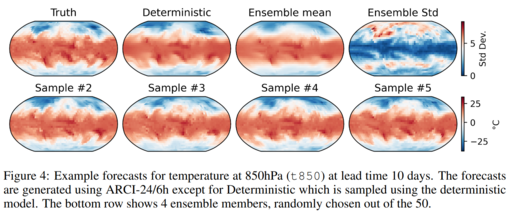November 2024

Welcome to the Climate Change AI Nordics Newsletter November 2024.
Climate Change AI Nordics is now Climate AI Nordics!
Climate Change AI Nordics has changed names to Climate AI Nordics. This Newsletter was sent out before the name change. Thus the old name is mentioned below. All the links have been updated to the new url, climateainordics.com.
During the last month, Climate Change AI Nordics was launched! The founding team is very excited about the future of this network.
Reply to this email address to contribute your own relevant news! We will include news on our web page, climateainordics.com and in our newsletter. Take the chance of showcasing your work or your events to the community!
Do you know researchers who works in the intersection of AI and Climate Change? Tell them about Climate Change AI Nordics! climateainordics.com/join
2025 Nordic Workshop on AI for Tackling Climate Change

2025-05-13 The 2025 Nordic Workshop on AI for Tackling Climate Change will gather researchers from the Nordics. This one-day, in-person workshop, will take place in Gothenburg, Sweden, May 13th 2025. The workshop will feature a mix of keynotes, oral presentations, and posters around the topics of AI for climate change, including AI for biodiversity and the green transition. The workshop will be a meeting point for a wide range of researchers from (primarily) around the Nordic countries.
(Read more)
Featured Preprint: Continuous Ensemble Weather Forecasting with Diffusion Models

2024-11-22 In Featured Preprints, preprints from affiliated researchers are summarized and featured at Climate Change AI Nordics. This one features "Continuous Ensemble Weather Forecasting with Diffusion Models", from Martin Andrae, Tomas Landelius, Joel Oskarsson, and Fredrik Lindsten.
(Read more)
CCAI Nordics is now present on LinkedIn

2024-11-15 Follow Climate Change AI Nordics on LinkedIn.
(Read more)
Estimation of water quality parameters using remote sensing data and machine learning models

This event takes place 2024-11-28 15:00. Webinar with Alireza Taheri Dehkordi, Lund University. The global decline in water quality, exacerbated by climate change and population growth, underscores the need for continuous and accurate monitoring of water quality parameters (WQPs). Remote sensing (RS) data, especially from multispectral satellites like Sentinel-2 and Landsat-8, offers large-scale, periodic observations for tracking WQPs. However, deriving accurate estimates solely from RS data is complex due to the intricate relationships between spectral bands and water quality indicators. This talk presents two novel machine learning approaches that leverage advanced RS data processing to enhance water quality monitoring.
(Read more)
CCAI Nordics in Computer Sweden on how AI can help save the climate

2024-11-12 As COP29 is convening in Azerbajdzjan, Olof Mogren, co-founder of Climate Change AI Nordics was interviewed in Computer Sweden. “When it comes to climate change, we have to work broadly both with mitigation techniques and by adapting to the effects we are already seeing”. “AI can be a tool to support these efforts”.
(Read more)
CCAINORDICS.com is now live!

2024-10-25 Climate Change AI Nordics is a network for researchers in the nordics working on problems related to tackling climate change using AI and machine learning. Our web site is now live.
(Read more)
Frontiers in machine learning for weather forecasting

This event happened 2024-11-07 15:00. Webinar with Joel Oskarsson, Linköping University. Recent years have seen rapid progress in using machine learning models for weather forecasting. These models show impressive performance, matching or even outperforming existing physics-based models, while running in a fraction of the time. This is fundamentally and rapidly changing the landscape of weather forecasting today. In this talk I will discuss the factors that enabled this paradigm shift, the core machine learning methods used and the research questions at the bleeding edge of machine learning for weather. In particular I will focus on how current methods can be extended to regional and probabilistic forecasting. For regional forecasting I will showcase graph-based methods for building limited area weather forecasting models. I will also discuss how generative machine learning methods can enable probabilistic forecasting, giving much-needed estimates of uncertainty and allowing for predicting extreme weather events.
(Read more)
Artificial Intelligence for Climate Change Mitigation

This event happened 2024-11-21 15:00. Webinar with Alp Kucukelbir, Columbia University. Artificial intelligence (AI) has the potential to make very significant contributions to climate change mitigation. The complexity and scale of the challenge is broad. In this talk, I break down opportunities for AI to effect incremental and transformational change across multiple sectors, focusing on industries with large carbon footprints. I highlight barriers and risks to the adoption of AI, including the carbon footprint of AI usage worldwide. I focus on the multiple definitions (and ultimate importance) of "trust in AI" and its impact on the integration of AI into complex workflows. This talk is for AI practitioners looking to understand how AI fits into the bigger picture of climate change. I highlight opportunities and challenges in each sector that I hope will motivate collaboration across academia and industry.
(Read more)
CCAI Nordics are a network of researchers dedicated to developing and utilizing AI technologies to address the urgent global challenge of climate change. Our researchers focus on creating and promoting AI solutions that support both climate change mitigation, reducing the severity of climate change, and adaptation, adjusting to the effects of climate change. We are already in a climate emergency which is causing biodiversity loss, extreme weather events, and human suffering, and this necessitates a multifaceted approach involving both policy change, limitations on activities contributing to climate change, and bolstering societal resilience against climate-related events.
CCAI Nordics promotes the development of AI-based analytical tools and optimization techniques that can inform decision-making processes crucial for ensuring a sustainable future for generations to come. In particular, we recognize that technology, particularly AI-based solutions, can play a role in supporting efforts such as rewilding, rewetting, and reducing emissions and the reliance on fossil fuels.
By bringing together researchers in the Nordic countries, CCAI Nordics aims to:
- Foster collaboration and knowledge exchange through seminars and workshops.
- Help develop AI-driven solutions that contribute to the creation of climate-friendly products and services, optimize processes for efficiency and sustainability, and promote justice in addressing the impacts of climate change.
We hope that the collaborative nature of CCAI Nordics will accelerate progress in this critical field, enabling the sharing of expertise and resources to develop impactful AI solutions for climate change mitigation and adaptation.
